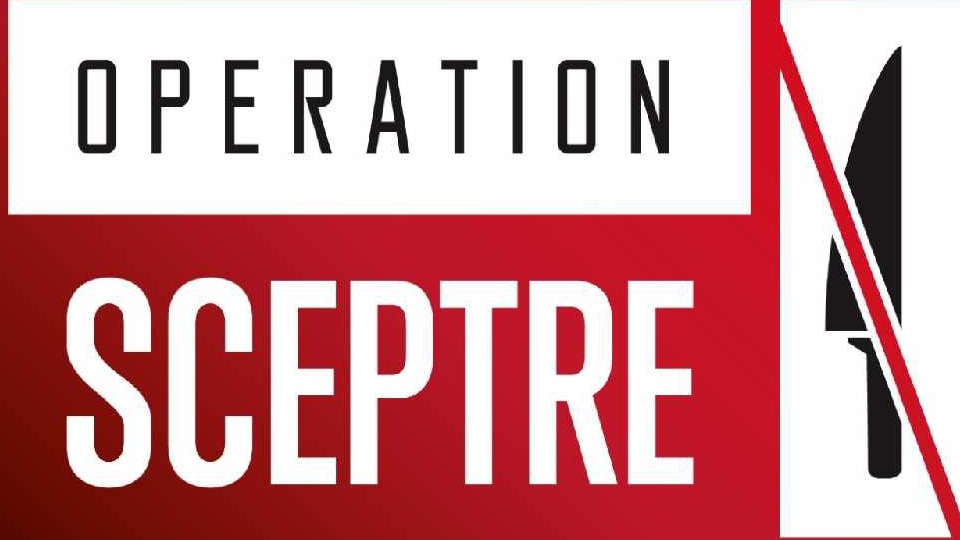GMP supporting national operation to tackle knife crime
Date published: 10 November 2020

During the week-long operation, GMP’s knife arches will be deployed at undisclosed locations targeting those carrying knives along with any other criminality
Officers from Greater Manchester Police (GMP) are currently taking part in the Operation Sceptre National week of action, which aims to raise awareness of the dangers of knife crime and reduce it by targeting those carrying weapons.
During the week-long operation, which began yesterday (Monday), the force’s knife arches will be deployed at undisclosed locations targeting those carrying knives along with any other criminality.
In addition, officers will be carrying out weapon sweeps of local parks and open spaces, stop and search activity where appropriate, and visiting habitual knife carriers to engage and explain the dangers and consequences that can come from carrying a knife.
Officers will also be engaging with local schools and youth provision to educate young people on the impact of knife crime and provide intervention opportunities.
Retailers have an important role to play in tackling knife crime by helping to ensure that knives are not falling into the wrong hands.
With this, officers will be visiting local retail stores to ‘knowledge check’ staff regarding the sale of knives.
Superintendent Chris Downey, who is GMP's knife crime lead, said: "Even during these unprecedented and challenging times, we must ensure we're doing everything we can to reinforce the message that carrying a knife is unacceptable and that no good can come from carrying one.
"Knife crime remains a force priority, and we are committed to taking a collaborative approach to tackle knife crime across Greater Manchester.
"We are continuing to build on the already successful work that has been ongoing for some time through Greater Manchester Violence Reduction Unit (VRU).
"The work of the VRU is part of the wider approach to tackle knife crime and violent crime, such as making sure victims receive the right support, improving the criminal justice response to all forms of serious violence, engaging with schools to increase awareness of the consequences of getting involved in violent crime, identifying and working with young people at risk of violent crime, and developing a community-led approach to prevention and early intervention.
"A large part of our work is out in our communities with young people, educating them on the impact knives can have not just on individuals, but on families and communities.
"Even though we will be engaging with young people throughout the week, unfortunately this year due to Covid-19 restrictions, some of our intended work has had to be scaled back.
"With this, I am asking parents, guardians and extended family members, to talk to your young family members about knife crime as you can all play a vital role in preventing them from becoming involved with knife crime.
"We advise you to try to talk to them openly about the dangers, as well as the life-changing consequences that come from carrying a knife.
"We have some simple advice to help you have the conversation.
"Firstly, establish the most appropriate time and setting to have an open conversation about knife crime; it should be somewhere that you both feel comfortable.
"Be aware that a young person may be reluctant to talk to you about knife crime, so reassure them that they can be honest with you, as well as letting them know that you’ll listen to what they have to say and support them without judgement.
"You should encourage them to share their fears and worries around knife crime.
"We know that fear and a feeling of vulnerability is often the reason behind people carrying knives.
"Many young people do so because they are afraid for their own safety and they believe a knife will protect them.
"So it's important that they realise, that the chances of becoming a victim of knife crime increases just by carrying one.
"Sharing your own fears can also help, as this can help them open up.
"It's important to highlight that vast majority of young people don’t carry a knife as they do not give you protection, and it's not acceptable.
"Let them know that they do have a choice when it comes to carrying a knife, even though it may seem to them like they don’t.
"Encourage them to consider who they’d be affecting if they get involved in knife crime and what consequences can come from it, such as being expelled from school, being sent to prison or even worse, someone tragically losing their life.
"Also reiterate to walk away from a dangerous situation.
"Finally, explain that they can always report their concerns about anyone carrying a knife anonymously through CrimeStoppers.
"You may hear some upsetting and concerning things about what your child, and even their friends may be involved in, but try not to get upset or overreact as you don't have to deal with this on your own – help is available via CrimeStoppers on 0800 555 111, or the Fearless campaign website: https://www.fearless.org/en/give-info."
If you have concerns about someone you know or care about who is carrying or hiding a knife, or if you are aware that knives are being concealed in your community, call the Police on 101 or talk to officers via LiveChat at: www.gmp.police.uk.
Always dial 999 in an emergency.
Do you have a story for us? Want to tell us about something going on in and around Oldham? Let us know by emailing news@oldham-chronicle.co.uk , calling our Oldham-based newsroom on 0161 633 2121 , tweeting us @oldhamchronicle or messaging us through our Facebook page. All contact will be treated in confidence.




